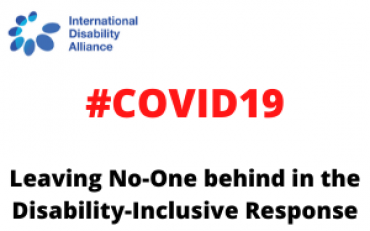This is one story as part of the Voices of People with Disabilities during COVID19 Outbreak series
Names may have been changed to protect the individuals mentioned in the story.
This story has been prepared in collaboration with Sightsavers.
“Everything makes you feel rejected in society, because you can’t do something by yourself and someone is not there willing to help you. It makes you feel low and that is my lowest moment. It has a hard feeling.” This is the response of Samuel, a 21-year-old man with physical disability from Kenya when he was asked to describe his feelings during the pandemic. Covid19 has impacted on his life in many ways.
Transport
Samuel uses a wheelchair. Like many other persons with disabilities, challenges to accessing transportation have been aggravated during Covid19:“In my house I can rely on myself but when I want to travel from one point to another where I may require public transport, that may be difficult for me because of this virus. For example when I want to get into a taxi, I have to ask someone to lift me up and put me on the seat, since taxis are not accessible for those who use wheelchairs. But, as a result of social distancing, it’s impossible for someone to get into contact, so that might make it difficult for me now.
“I’m speaking out of experience, the other day I wanted to go somewhere and see a friend but that was impossible for me because nobody will come into contact with anyone who is unfamiliar due to the Covid19. I am only able to keep in touch with friends on social media and WhatsApp because of restriction of movements and social distancing.”
Unemployment
“When am I going to get a job and fend for myself and get something to save and start a new life? That’s my greatest worry at the moment,” he says.
Samuel studied communications and media and is looking for a full-time job in a company which has an accessible building. He explains that his options are limited to jobs which are accessible for him:“Those without disabilities can do any other work, especially the manual work. Not necessarily easy to get the job you applied for so you can choose to be a vendor, engage yourself in construction, those manual and casual work like sweeping.
“I’m just doing some freelance editing from home using my own laptop and phone,” Samuel explains. “Some upcoming YouTubers would contact me and say they had shot some footages and I do their work. Some would recognise me by sending some hand outs and to some extent that boosted me because they pay a little. But it’s not a guarantee that I’m going to get a client”, Samuel explains. “They would pay only 300 shillings for a seven-minute clip. It’s not that much but I can use that money for two days for meals.
“No client has contacted me since the coronavirus came. Before I’d get a client once a week.
“If I get an opportunity I won’t mind with this corona because I’ll try my best to achieve my goals. I have a feeling that corona virus is a setback for me to come back from. I’m not expecting any employer to contact me because of this pandemic. Those places where I applied for my job no one can be employed at the moment, there’s no hope that any companies will be employing right now when they’re incurring losses.”
Food insecurity
“It is more difficult to get food now, as people are not working who might otherwise help you financially. Especially my parents. They are not able to support me as they used to”, Samuel says.
Due to unemployment and reduction of family support, Samuel is currently facing serious barriers to accessing sufficient food: “I take one meal per day, and that is lunch, because I mind about tomorrow. If I take three meals, tomorrow I might end up starving. So I try to economise what we have. It’s hard.”
Samuel has not received any support from the government: “In many occasions where the food is offered by the government, everyone is scrambling for the few resources so there are queues. I might send someone to represent me, but where they are queuing no one is going to recognise that this person is a care giver for someone living with disabilities. Because resources are scant and the population is high you find many people don’t get the opportunity to get served, even those people that come earlier.”
Samuel adds that recently food has been distributed in buildings that are not accessible: “so I have to send someone to represent me, but the person will return empty handed because he or she was not served”, he explains.
Enhanced Stigma
Samuel has experienced enhancement of stigmatized behaviour because of his disability: “Because you are not working other people find you idling and think you are a beggar. I reject 10 shillings, I don’t know him or her, why would they come and give me 10 shillings, it’s demoralising.”

